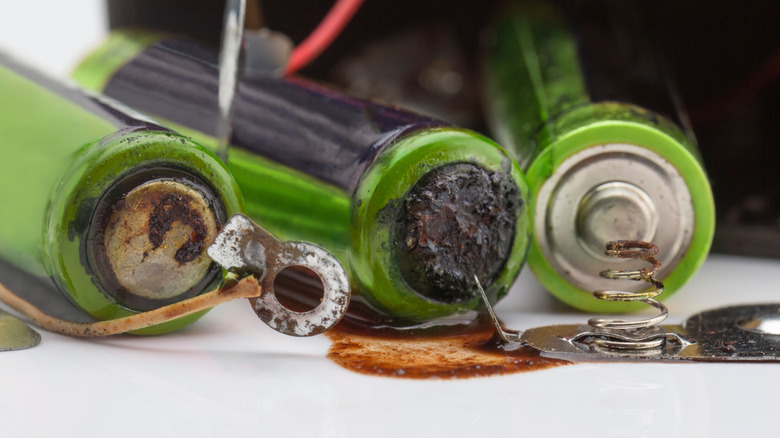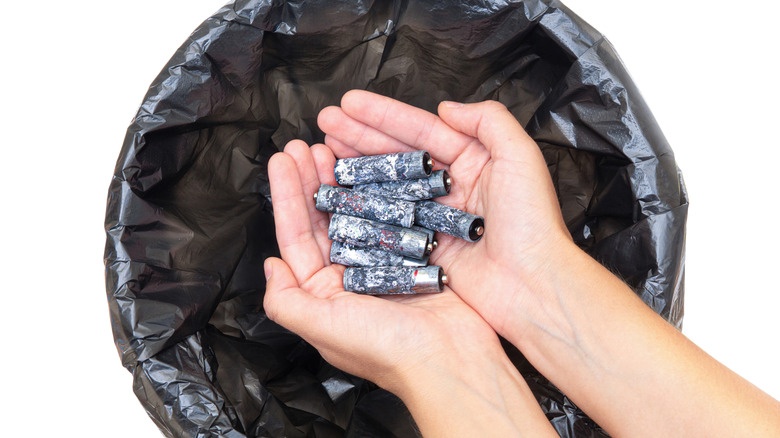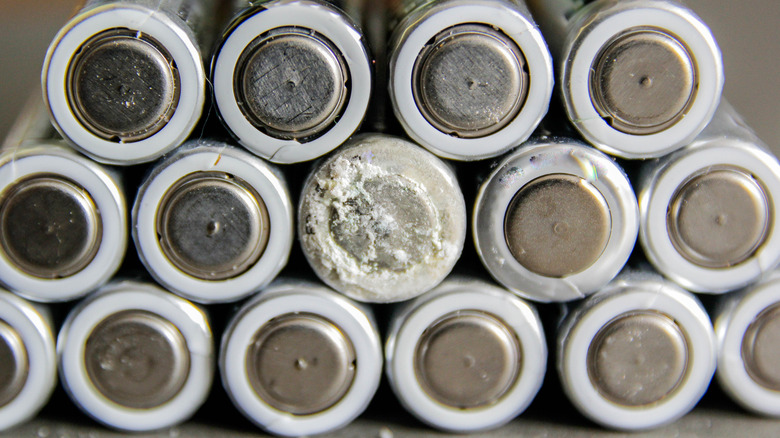Here's Why Batteries Leak (And What To Do If It Happens)
An unfortunate experience of owning electronics is trying to use them after a long time. If the batteries are left inside and the electronic elements don't work, odds are there's a mess waiting for you in the battery compartment. Over time, batteries will corrode and leak, oftentimes leaving your electronic devices unable to function normally. No matter which of the best or worst battery brands you buy from, this is just a reality of utilizing this energy source. Still, one has to wonder what causes apparently perfectly good batteries to break and leak in the first place.
There are a few reasons why batteries can leak. Extremely high temperatures can cause the casing to rupture, as can physical damage. More commonly, though, alkaline batteries will leak due to a lack of use. Without any kind of discharge, batteries will accumulate hydrogen within, which causes a rapid increase in internal pressure. The casing will eventually reach a breaking point, cracking in one or several places. The hydrogen gas will release, and, as an unfortunate byproduct of all this, the chemicals inside the battery will come pouring out. This, in turn, will impact the electronic device the problem battery is in.
Leaking batteries should be removed and disposed of properly
Once a leaking battery is discovered, it shouldn't be left to continue leaking. It should promptly and safely be removed — ideally with the aid of protective gloves — from storage or the electronic device it was left in and disposed of in the right way. It's not a good idea to just toss leaking batteries in the garbage, as they'll continue to leak, and the chemicals released will go on to pollute the environment if left in a landfill. This is arguably the worst of the things that can happen to a disposable battery when you're done with it. Instead, leaking batteries should be placed in a plastic bag and brought to a local recycling facility.
With the batteries themselves taken care of, you can turn your attention to the mess they left behind. The first step in the cleanup process is to turn off any switches on the device. You now want to add a few drops of lemon juice or vinegar to the impacted areas inside the battery compartment, which should cause the chemical residue to fizz and bubble. After a moment, wipe the area out with a cotton swab. Add a bit of pure isopropyl alcohol to the concoction, wipe it around with a fresh cotton swab, and finally, wipe everything down with a microfiber cloth. Ideally, the battery terminals won't be so far gone that they'll need replacement.
What does leaky battery prevention look like?
To keep your devices safe, you want to remove the batteries from them when they're not being used. This is especially true for seasonal decorations and anything else that won't be used for months at a time. Batteries can break and leak if they're exposed to extreme temperatures, so when they're being stored, they should be somewhere that remains a consistent temperature, such as somewhere safe indoors, rather than a non-climate-controlled shed or garage.
You should also be mindful of what's around your batteries in storage. Contact with metal objects could lead to breakage and leaking, so it's a good idea to keep batteries in their original packaging. This way, there won't be any dangerous contact. Naturally, there shouldn't be an excess of moisture where your batteries are stored, so keep them away from water sources and out of humid environments. There's a risk of leakage if different battery types are mixed, too, as one or more could discharge faster than the others, potentially causing leakage. If stored properly, unused alkaline batteries should remain in usable condition for between five and 10 years.
There can be plenty of risks surrounding batteries. For instance, there are major risks surrounding the use of counterfeit batteries, and things can get dicey if batteries are stored or used improperly. If you're not careful, you could have a serious leak on your hands.


